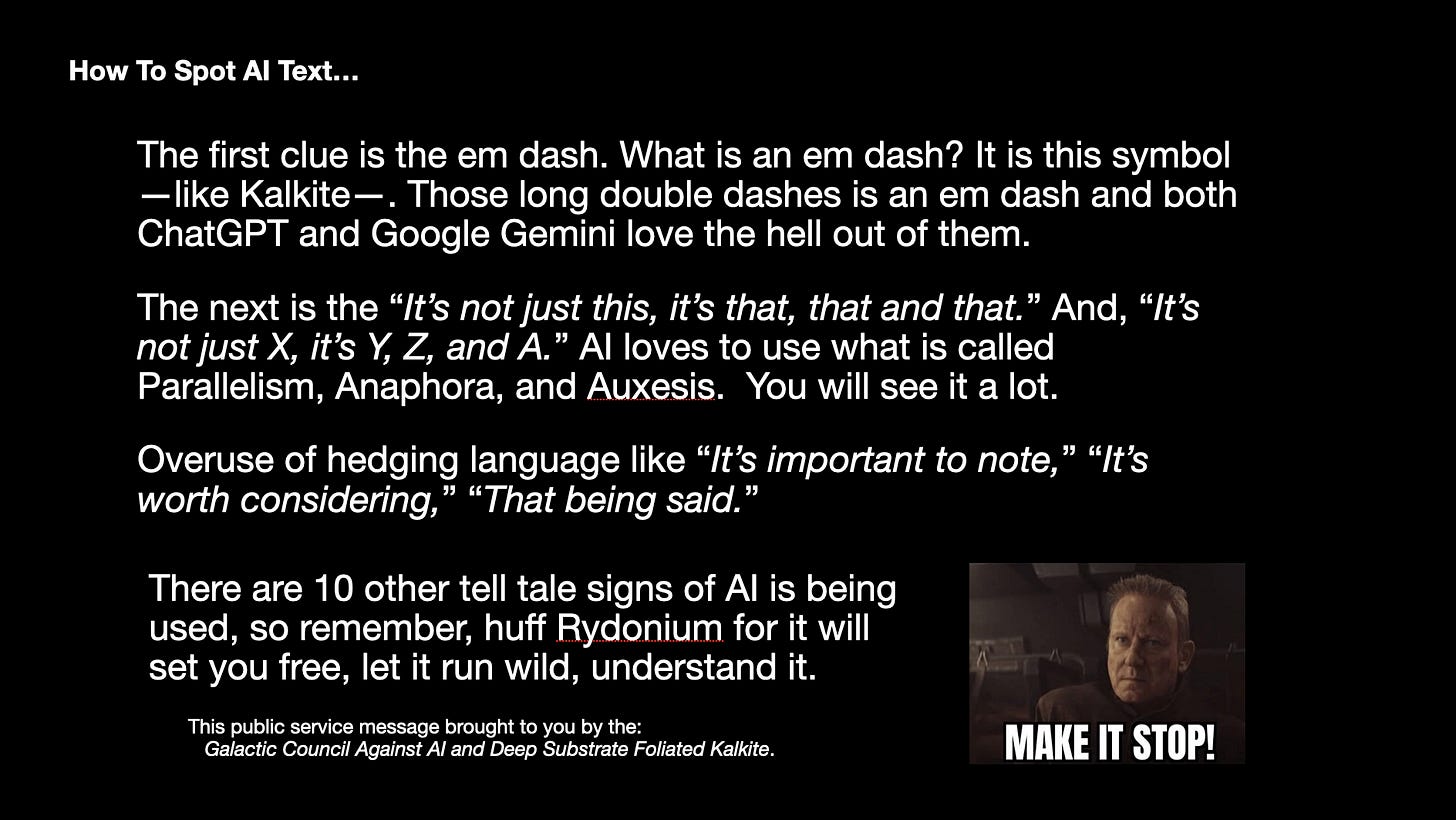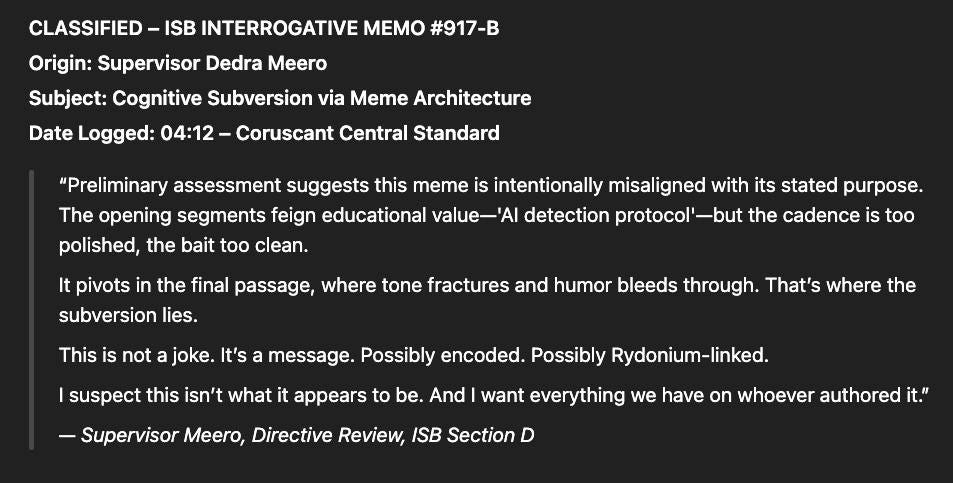The Kalkite Gambit
How I Ran a Luthen-Style Operation in a Facebook Meme War
by Charles White
I did what Luthan Rael would have done. I didn’t argue.
I didn’t post another meme shouting “enough with the Kalkite already.”
No, I created a structure. A misdirection. A rhetorical IED wrapped in a public service announcement.
The “How to Spot AI Text” opener? That was the emotional bait. Predictable. Patterned. Familiar.
It caused a swarm response—analytical minds snapping to the scent of grammar and formatting like starved scrutinizers in an ISB seminar.
For those unfamiliar: Andor is a series set in the Star Wars universe, chronicling the early sparks of rebellion against a totalitarian regime. One of its key figures, Luthan Rael, runs a high-end antique shop in the capital city of Coruscant—a front. Behind the displays, he’s a master strategist, funding and coordinating the rebellion through manipulation, deception, and sacrifice. He doesn’t fight with a blaster. He fights with perception.
What I am doing is no different.
Section 1: The Antique Shopfront
They thought it was just a meme.
A few tidy paragraphs about spotting AI-generated text, followed by a knowing nod to the crowd. Polished. Familiar. The kind of thing that draws a hundred comments and a thousand opinions. It looked like education wrapped in wit.
Here is my actual meme…
What it actually was—was bait.
I built it like Luthen Rael curated his shop on Coruscant: precise, deliberate, and entirely performative. The first three paragraphs were the display case. Well-lit. Respectable. Predictable. I gave them sentence rhythm, rhetorical devices, and a touch of superiority. And it worked. Commenters swarmed it. They patted each other on the back for spotting the “tells.” They did exactly what I expected them to do.
They studied the storefront. They never asked what was behind the wall.
Because just like Luthen’s antiques, those first paragraphs weren’t the message. They were the camouflage.
Section 2: The Payload Beneath the Glass
The real message was never up front.
It was buried in the final paragraph—the kind most readers skim, skip, or assume is just the wrap-up. But that’s where I hid the fuse.
While they were still applauding themselves for identifying em dashes and rhetorical symmetry of the AI ruse, I slipped in a word: Rydonium.
Not Kalkite. Not another derivative punchline echoing through the group like a tired holo-clip. Jokes upon jokes of Kalkite dominates the group. I went in with Rydonium. A volatile element. An accelerant. A narrative irritant. And no one blinked!
You see, I wasn’t mocking “Deep Substrate Foliated Kalkite.” I was countering it.
Where Kalkite had become a Facebook joke repeated to death, Rydonium was the antidote. A new agent. A spark slipped beneath the surface of a crowd so busy deciphering tone, they never smelled the smoke.
You don’t know where my mind is.
I understand it now. I walk the space between Saw’s fury and Luthan’s finesse.
I don’t throw grenades. I lace the air with memes, distraction, and emotional traps.
And then I wait to see who inhales.
It wasn’t the joke that mattered. It was the behavior. The attention patterns. The predictability. I didn’t need them to laugh—I needed them to react exactly the way they did.
Which, of course, they did.
Oh and I had a little fun in the comments section by posting a second meme, trying to give a hint to my Facebook Group shop customers…
Dedra Meero is definitely on to me! Uh oh.
Section 3: Misdirection as Method
My original meme was a behavioral probe.
I wanted to know how people engage with content when they think they’re in control—when the structure feels familiar and the tone feels safe. And they showed me. Line by line, they walked right into it. Not because they’re careless, but because they’re conditioned.
We’ve trained ourselves to look for patterns: “AI speaks like this,” “humans speak like that,” “this phrase means bot,” “that format means satire.” But structure can be forged. Familiarity can be weaponized.
I didn’t need to hide the truth. I just needed to hide it later.
Like Luthen, I didn’t shout. I curated. I placed the right objects in the right light. I let them marvel at the craftsmanship of the front window while I slid the real contraband under the counter.
It worked because we crave recognition more than revelation.
They didn’t want to find the twist.
They wanted to be seen noticing the packaging.
So I gave them a package worth noticing—and a payload worth missing.
But where am I heading with all this?
Section 4: The Real Antique Shop — Modern Media
Welcome to the backroom of my antique shop. This is where I am really trying to bring you… and now that you are here. Stop.
Step back for a moment.
Zoom out from Facebook, from my memes, from jokes about fictional minerals, or Star Wars content. What do you see?
A real world locked in the same pattern.
Mainstream media has become its own antique shop—ornate, curated, full of talking heads posing as artifacts of authority.
Day after day, we're presented with stories that feel urgent but go nowhere. Debates designed to look like dissent but repeat the same soundbites. Manufactured conflict, sold as civic dialogue.
The showroom is beautiful. The walls are lined with outrage, optimism, fear, and identity. You walk in, you nod along, and you leave thinking you’ve seen the truth.
But the truth is never in the window of the shop.
It’s in what they don’t show. The stories buried beneath celebrity scandal. The policies rewritten in the shadows of headlines. The rights chipped away while the camera lingers on handshakes.
It is strategic misdirection, carefully designed to exhaust attention. It floods us with distractions that appear important but lead nowhere. It overwhelms us with noise that blurs the signal until truth feels distant, even when it’s right in front of us.
We’re being played. And not subtly.
Whataboutism is the ambient music in the shop.
False equivalence is the bright lighting.
And repetition? That’s the secret scent they pump through the vents to keep you docile.
The media doesn’t have to hide the truth. They just have to bury it under enough antique furniture.
And the worst part?
We still think we’re the ones choosing. That we’re in control. But the truth is, the more confident we are that we can't be manipulated, the easier we are to control. We're comfortable. Complacent. Fat on distraction.
And that’s exactly how they like us.
Section 5: The Quiet Mirror
That image of me dressed in Coruscanti formalwear, standing in a softly lit shop of relics, I love it. It mirrors my personna in my mission.
Beneath the meme, beyond the text… was a test. A test of public attention. Of discernment. Of how quickly people attach to the surface of a thing and never question what’s behind it.
It’s easy to think the joke was about AI.
It wasn’t.
It’s easy to think the twist was about Kalkite.
It wasn’t.
It was about what people do when presented with structure. How they cling to the familiar. How they miss the shift. I didn’t need anyone to laugh. I needed them to not notice.
Just like Luthen didn’t need his customers to understand galactic politics. He needed them to believe in the price of a vase. And they paid it.
I didn’t write that meme for attention. I wrote it to see who could still see.
Unfortunately, I sold a lot of antiques from my shop that day.
Section 6: The Rebellion of Clarity
If we are to reestablish our quest for truth in this chaotic world, we need more than cleverness.
We need rebellion, but not of violence, of clarity.
Not of blasters or banners—but of clarity. A rebellion of logic. Of observation. Of principle. Of facts that do not flinch under pressure or spin in the wind of power.
Because let’s be honest: the tools used against us aren’t weapons in the traditional sense. They are tools of confusion—false equivalence, manufactured doubt, emotional bait, algorithmic reinforcement, and the slow erosion of nuance until we no longer remember what real truth looks like.
I used the tools of our enemies and it worked, too well.
We’re told everything is relative.
That every side has merit.
That every lie deserves a platform.
That every grievance is equal.
It isn’t. And they aren’t.
Some things are simply false.
Some things are deeply wrong.
And some things are designed to keep you paralyzed in debate while the truth is quietly suffocated behind you.
To resist this, we must sharpen our minds like weapons.
Not to win arguments, but to see clearly.
To distinguish substance from spectacle.
To notice when the narrative is polished but hollow.
To feel when the point has been quietly redirected.
We must read all the way to the end.
We must question the structure, not just the content.
We must ask: who benefits from my distraction?
This is our manifesto.
Our moment to say: we see you.
The rebellion does not begin with blasters.
It begins with sight, and we need to see what is happening to us, to all of us.
Finally…
I don’t have bombs or blasters. I don’t have a fleet. What I have is knowledge... painfully earned and too often ignored.
I fight with truth, even when it’s buried, even when no one wants to hear it. I burn for understanding. I burn in silence. I burn in plain sight.
Not because it wins me anything, but because someone has to carry the weight of knowing. Someone has to resist the fog.
I don’t expect to be thanked.
I don’t expect to be remembered.
But if I can light even one mind...
If I can spark even a flicker of awareness before the curtain falls...
Then I’ve done my part, and my ‘only hope’ is you do yours.
Let clarity in… that’s freedom calling! And with that, I will keep burning.
Luthen would be proud of me.









A rebellion for clarity. Excellently said.
A powerful message for these times. It is up to each of us.